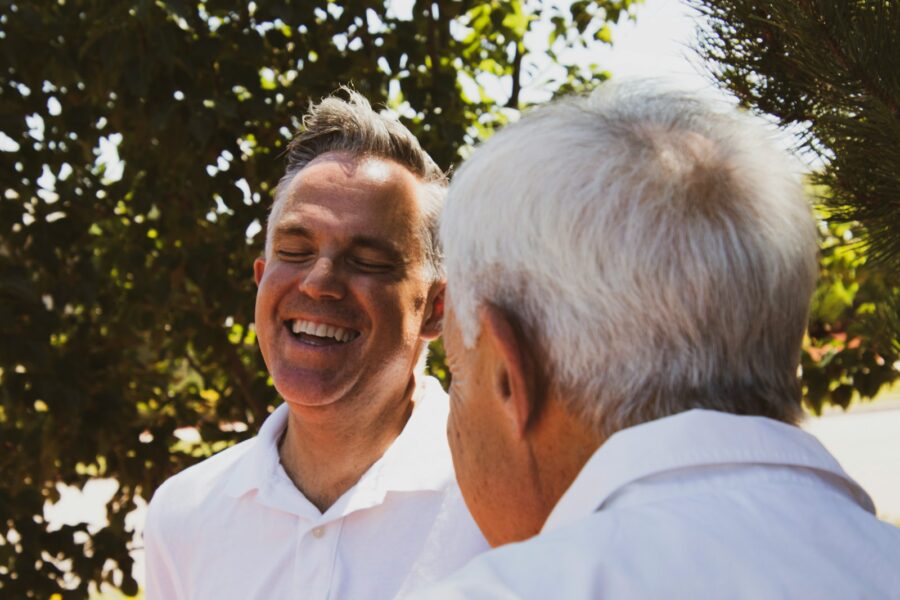It can be an emotionally difficult transition for many, the moment you realise you’ve become a carer for your elder parent. When ‘parentification’ happens and the roles reverse, it can be a tricky dynamic for both parties to navigate.
It’s likely that your relationship with your parent will change over time, which is a normal and natural progression of life. However, the degree to which your relationship changes will vary, depending on your life, your parent, the nature of their ailments and their living situation amongst other factors.
There are a few common relationship changes that can occur but there are ways to navigate them in a way that strengthens your bond.
Behavioural Changes
As your parent ages, it’s possible their attitude and behaviour will start to change. This could be simply because their bodies and minds are ageing, or it could be due to an illness or medical condition. Some conditions may affect their dignity, independence and sense of self. Others could affect their memory or cause them to become fearful, delusional or depressed.
Having the responsibility of ensuring your parent’s safety and wellbeing may directly affect your relationship – especially if it makes them more challenging to deal with on a day-to-day basis. On an emotional level, these changes can be painful to experience if you’re watching someone you love change considerably, sometimes to the point where they seem unfamiliar.
Everyone manages this transition differently. You might find that getting external help – be it for you or your parent – is the best way to manage.
This may include:
- Talking therapy / coaching or counselling
- Support groups with people in similar situations you can connect with
- Seeking professional help or from family members
Role Reversal
The power of dynamic in your relationship with your parent can shift considerably when role reversal happens. This can be an emotional and confusing transition for both or you to navigate as your new roles surface. Your parent is likely to sense a loss of control which they may resist, whereas you may feel unprepared to become the responsible one. Whatever complicated feelings are at play, one of the best ways to ease into the transition is to continue to treat your parent as just that, a parent.
It can help not to solely define yourself as ‘carer’ and try to remember to see them for who they are, rather than their condition. Where you can, try to maintain elements of your previous dynamic intact and give them opportunities to carry out the traditional role of your parent.
Increased Tension
There are additional factors that can add to the tension of becoming your parent’s main source of care. This can include practical stressors, such as time management and fitting their care into your already busy schedule, fear and worry regarding the financial implications of them needing care, or anxiety over future uncertainty.
Your elder parent will also be experiencing their own tension and feel a wide range of emotions including embarrassment, shame, guilt and frustration.
These tensions can result in disagreements and bickering so if you can, try and defuse the situation to prevent it escalating. Take some time to breathe and let the heat between you cool down. Once you’re in a calmer state, talk openly and let your feelings be known, and listen when they do the same.
It’s not all Doom and Gloom
Your relationship is changing, but not all these changes will be negative. Many people find that caring for their elder parent has strengthened their relationship. These changes are natural and can be a time for deeper connection and bonding. Caring for your elder parent will often result in spending more quality time together and may offer an opportunity to get to know one another in different ways. It can also allow you both to become more connected through the full-circle, shared experience of depending on each other throughout different stages of life.
Employer advice: Providing employees with workplace support
There are a number of ways organisations can support employees and help them balance their role as working carers. These include:
- Flexible working: Caring responsibilities are one of the biggest drivers for flexible working. By recognising that most employees value a blend of working arrangements and by empowering them, where possible, to work flexibly in a way that aligns with their family’s needs, it can help to enable their career success.
- Help with care solutions: Facilitating ongoing, ad hoc or back-up care is a key opportunity for employers. Many working carers resort to using annual leave to cover for medical appointments, emergencies or breakdowns in care, but a Back-Up Care programme enables them to work on a day they would have otherwise not been able to.
- Remove the barriers: Employees are cutting back at home and tell us that benefits that save money and support development make them more loyal. Enabling employees to follow their career paths by providing benefits and supports that remove cost of living barriers.
- Have more open conversations: Employers should make a concerted effort to pay attention to working carers and respond to ongoing concerns. Highlight working carers in all roles, let them tell their stories and signpost the resources you’ve provided to help them thrive.
- Review not only what’s on offer, but how it is communicated: Three quarters of those with caring responsibilities consider care needs before accepting a new job or promotion. It’s important to make family supports visible to new and existing hires and be sure that working carers are aware of access to flexibility and caring solutions.

Ian Wells
Ian Wells is Head of Operations and Service Delivery at Bright Horizons, responsible for the Work+Family Operations which includes the delivery of our Back-Up Care programme. Ian is also responsible for the Bright Horizons Customer Service (Contact Centre) teams. Before working at Bright Horizons, Ian was Head of Operations at British Red Cross where his responsibilities included Red Cross Training, a multi-million pound commercial business, delivering first aid and mental health training.


